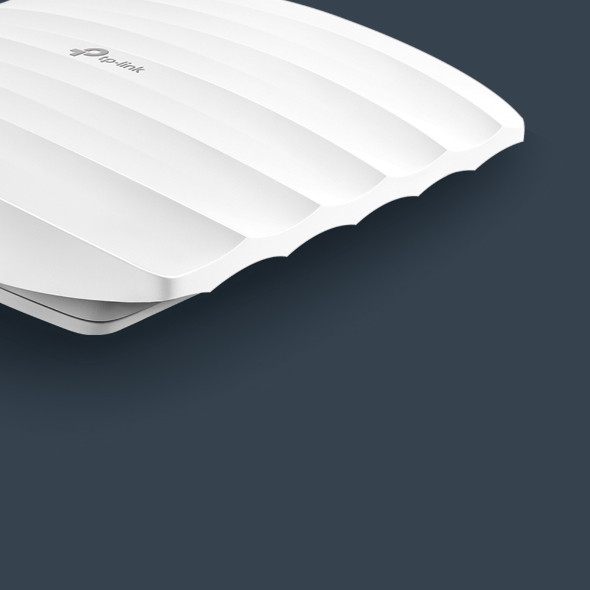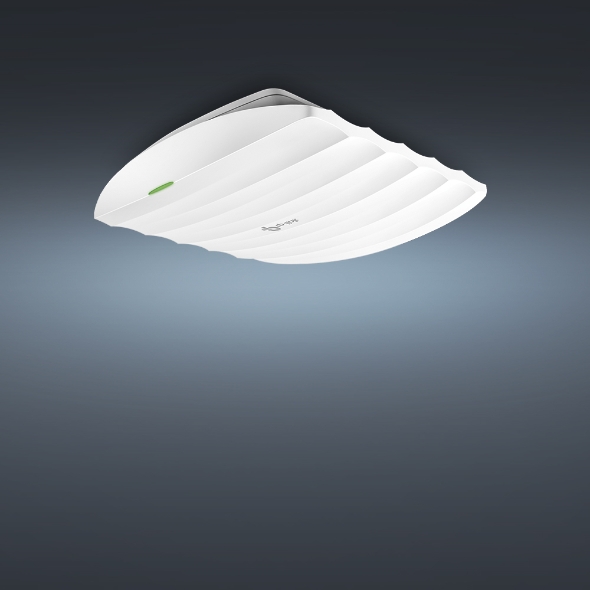EAP110
300Mbps Wireless N Ceiling Mount Access Point
- Integrated into Omada SDN: Centralized Cloud Management, and Intelligent Monitoring.
- Centralized Management: Cloud access and Omada app for ultra convenience and easy management.
- PoE Support: Supports Passive PoE (PoE adapter included) for convenient deployment.
- Easy Installation: Simple mounting design for easy attachment to a wall or ceiling.
- Secure Guest Network: Along with multiple authentication options (SMS/Facebook Wi-Fi/ Voucher, etc.) and abundant wireless security technologies.
- Load Balancing: Limit the number of users on each access point and remove devices with weak reception to keep your Wi-Fi running at peak performance.
- Scheduling: Automatically reboot the access point and turn on or off the Wi-Fi at the time you set.
Business Class Ceiling Mount Access Point
Flexible Placement
Easy mounting design & PoE
The EAP’s elegant appearance and easy mounting design with chassis make it easy to be integrated seamlessly into any wall or ceiling surface to blend in with most interior decorations. EAP110 supports Passive PoE to make deployment effortless and flexible.
- Compact Design
- Flexible Deployment
- Passive PoE
Seamless Integrated into Omada SDN Platform
The Omada Software Defined Networking (SDN) platform integrates network devices including access points, switches, and routers to provide 100% centralized cloud management and create a highly scalable network—all controlled from a single interface.
- Hardware or Software Controllers
- Centralized Cloud Management
- Intelligent Monitoring
Wi-Fi 6 AP for High-Density Environments
Ceiling Mount AP
Wall Plate AP
Outdoor AP
JetStream PoE Switch
Omada Hardware Controller
Or
Omada Software Controller
Web Browser
Omada App
Cloud Access
Internet
Omada VPN Router
Captive Portal
Guest Network with SMS Support
The captive portal helps maintain only authorized guests to use the network, presenting devices with a convenient, user-friendly authentication method to grant Wi-Fi access. The addition of SMS authentication simplifies the captive portal even further to simplify connectivity and boost your business.
Easy Management with the Omada App
Follow configuration instructions on the free Omada app to get set up in minutes. Omada lets you configure settings, monitor the network status and manage clients, all from the convenience of a smartphone or tablet.
Related Cases
-
Barranquilla Plaza Hotel
TP-Link Helps Barranquilla Plaza Hotel Build a Reliable and Efficient Network
Barranquilla Plaza Hotel
TP-Link Helps Barranquilla Plaza Hotel Build a Reliable and Efficient Network
“HBP management has expressed intense satisfaction with their newly implemented solution and 100% of the staff has reported improved internet service. TP-Link’s Omada Solution provided the reliable, high-performance wireless network that HBP and its guests demanded.” -
Chase Grammar School
TP-Link Helps Chase Grammar School Accelerate Learning with BYOD
Chase Grammar School
TP-Link Helps Chase Grammar School Accelerate Learning with BYOD
“The installation was extremely straightforward. It was a simple matter of plug and play. The cluster function in particular saved me many hours con¬figuring each access point. On a day-to-day basis I can log into the closest access point to see how the whole network is performing and make any tweaks necessary.” —Leo Li, Director for Administration at Chase Grammar School
| HARDWARE FEATURES | |
|---|---|
| Interface | 1× Fast Ethernet (RJ-45) Port (Support Passive PoE) |
| Button | Reset |
| Power Supply | 24V Passive PoE (+4,5pins; -7,8pins. PoE Adapter Included) |
| Power Consumption | 2.8 W |
| Dimensions ( W x D x H ) | 7.5×6.7×1.2 in (189.5×170.5×29.7mm) |
| Antenna Type | Internal 2× 4 dBi Omni |
| Mounting | Ceiling /Wall Mounting (Kits included) |
| WIRELESS FEATURES | |
|---|---|
| Wireless Client Capacity | 100+** |
| Wireless Standards | IEEE 802.11n, IEEE 802.11g, IEEE 802.11b |
| Frequency | 2.4–2.4835 GHz |
| Signal Rate | • 11n: Up to 300 Mbps (dynamic)• 11g: Up to 54 Mbps (dynamic)• 11b: Up to 11 Mbps (dynamic) |
| Reception Sensitivity | • 300M: -71 dBm@10% PER• 150M: -75 dBm@10% PER• 54M: -78 dBm@10% PER• 11M: -93 dBm@8% PER• 6M: -92 dBm@10% PER• 1M: -96 dBm@8% PER |
| Wireless Functions | • Multiple SSIDs (Up to 8 SSIDs)• Enable/Disable Wireless Radio• Automatic Channel Assignment• Transmit Power Control (Adjust Transmit Power on dBm)• QoS(WMM)• Rate Limit• Reboot Schedule• Wireless Schedule• Wireless Statistics based on SSID/AP/Client |
| Wireless Security | • Captive Portal Authentication• Access Control• Wireless MAC Address Filtering• Wireless Isolation Between Clients• SSID to VLAN Mapping• Rogue AP Detection• 802.1X Support• 64/128/152-bit WEP / WPA / WPA2-Enterprise,WPA-PSK / WPA2-PSK |
| Transmission Power | • CE:≤19 dBm (EIRP)• FCC:≤21 dBm |
| MANAGEMENT | |
|---|---|
| Omada App | Yes |
| Centralized Management | • Omada Hardware Controller (OC300)• Omada Hardware Controller (OC200)• Omada Software Controller |
| Cloud Access | Yes (Through OC300, OC200, or Omada Software Controller) |
| Email Alerts | Yes |
| LED ON/OFF Control | Yes |
| Management MAC Access Control | Yes |
| SNMP | v1,v2c |
| System Logging Local/Remote Syslog | Local/Remote Syslog |
| SSH | Yes |
| Web-based Management | HTTP/HTTPS |
| L3 Management | Yes |
| Multi-site Management | Yes |
| Management VLAN | Yes |
| OTHERS | |
|---|---|
| Certification | CE, FCC, RoHS |
| Package Contents | • 300Mbps Wireless N Ceiling Mount Access Point EAP110• Passive PoE Adapter• Power Cord• Mounting Kits• Installation Guide |
| System Requirements | Microsoft Windows XP, Vista, Windows 7, Windows 8, Windows10, Windows 11, Linux |
| Environment | • Operating Temperature: 0–40 ℃ (32–104 ℉)• Storage Temperature: -40–70 ℃ (-40–158 ℉)• Operating Humidity: 10–90% RH non-condensing• Storage Humidity: 5–90% RH non-condensing |
†Maximum wireless signal rates are the physical rates derived from IEEE Standard 802.11 specifications. Actual wireless data throughput and wireless coverage are not guaranteed and will vary as a result of 1) environmental factors, including building materials, physical objects, and obstacles, 2) network conditions, including local interference, volume and density of traffic, product location, network complexity, and network overhead, and 3) client limitations, including rated performance, location, connection, quality, and client condition.




















